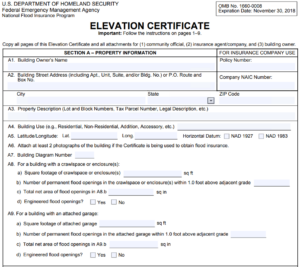Elevation Certificate
If your home or business is in a high-risk area, you will likely need an Elevation Certificate (EC). An Elevation Certificate documents important features of your property, including its location, flood zone, building characteristics and, most importantly, the elevation of its lowest floor.
An Elevation Certification is needed to know your building’s elevation compared to the estimated height floodwaters will reach in a major flood helps provide a true picture of the status of compliance with floodplain ordinances so as to determine your flood risk and the cost of your flood insurance premium.

How to get an Elevation Certificate
- Contact your local floodplain manager. There might already be an elevation certificate on file for that property. Every community participating in the National Flood Insurance Program (NFIP) has a floodplain manager, although that person might have a different title or serve in multiple capacities. To get started, call your town or city government office and ask for the floodplain manager or the person who handles Elevation Certificates for that community.
- If you have trouble connecting with your local floodplain manager, you can contact your state’s floodplain management office. The state floodplain manager is also referred to as the NFIP state coordinator. Find your state coordinator here.
- Ask the sellers. When buying a property, ask the sellers to give you their Elevation Certification. If they don’t have an EC, ask if they can provide one before settlement.
- Ask the developer or builder. In a high-risk area, the developer or builder might have been required to get an Elevation Certification at the time of construction.
- Check the property deed. Elevation Certifications are sometimes included with the property deed.
- Hire a licensed land surveyor, professional engineer, or certified architect who is authorized by law to certify elevation information. For a fee, these professionals can complete an EC for you.
Raise Your Elevation to Lower Your Risk
Building code requirements may change over time as flood risk changes and maps are updated. If you are remodeling or rebuilding, you will likely need a new Elevation Certificate to reflect the new building characteristics and lowest floor elevation. While remodeling, consider elevating to lower your flood risk, which, in turn, can lower your flood insurance rates and reduce the financial impacts of flooding.
FEMA’s Elevation Certificate Fact Sheet – 2023
See a sample Elevation Certificate
Visit the CRS Elevation Certificate Training Series from the Community Rating System.
